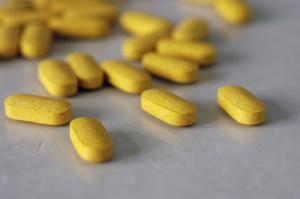
Taking Vitamin B1 for Bugs
Did you know that you can take vitamin B1 for bugs? That's right - this potent little nutrient can actually ward off mosquitoes while providing a host of other health benefits.
How Does it Work?
Vitamin B1, or thiamin, makes up an important part of the vitamin B complex. While there are conflicting reports within the scientific community regarding whether B1 actually repels insects, researchers believe that it works by producing a skin odor that's not noticeable by humans, but that biting bugs greatly dislike (Pediatric Clinics of North America, 16:191, 1969). If taking a B1 supplement, the recommended dosage is 25 to 50mg three times a day, though it takes roughly two weeks for the vitamin to build up in your system and start keeping bugs at bay.
Tablets of brewer's yeast, which is high in B1, effectively repel biting bugs.
Bug Spray is Dangerous!
Chemical bug sprays contain many neurotoxin chemicals, such as permethrin and DEET (or N,N-Diethyl-meta-toluamide). In addition to causing headaches, nausea, rashes and dizziness, these chemicals are also suspected to cause cancer (Tisch, M., et al). You absorb a great deal through your dermal layer, and anything that encounters your skin is quickly taken in to your blood stream. Think about how effective nicotine and birth control patches work - your skin is a doorway to your body, so it's important to avoid contact with toxic chemicals such as those found in bug sprays. The skin in the largest organ in the human body and it needs to be taken care of!
Consider Your Situation
Mosquitoes carry a range of serious diseases such as malaria and yellow fever. If you are in an area where these illnesses are common, you should discuss insect repellent options with a physician to weigh the pros and cons of a stronger, chemical-based bug spray.
Stuck on B1
To make it easier to take vitamin B1 for bugs, easy to apply patches are beginning to make their way into health food stores, such as the Bug Patch and the Don't Bug Me patch. Manufacturers claim that the transdermal delivery of B1 is more effective than taking a supplement, but in the end, nothing will aid the absorption of vitamin B1 more than getting it straight from the source: food!
Food High in Vitamin B1

If you'd like to take advantage of vitamin B1's bug repellent properties naturally, it's easy to up your intake by eating good, healthy foods. Some foods that are high in B1 include:
- Sunflower seeds are particularly high in thiamin
- Beans, such as black beans, green peas, and lentils
- Whole grains such as oatmeal and brown rice
- Yeast (brewer's yeast supplements)
- Dark leafy greens such as kale
- Organ meats, such as liver
- Enriched bread products
- Cauliflower
- Asparagus
- Potatoes
- Oranges
- Pork
- Corn
- Eggs
One thing to note, especially if you're upping your intake of vitamin B1 for bugs; since it is water soluble, B1 is automatically flushed from the body and your reserves will need to be stocked regularly, either by taking a vitamin supplement or eating foods rich in the vitamin. The next time you've got the munchies, consider munching on oranges slices or sunflower seeds as a snack!

An Important Note on the Safety of B Supplements
While vitamins are amazing things, there is always that chance that a supplement will interact negatively with medications and health conditions. In particular, B1 may not play nice with Tetracycline, diuretics, chemotherapy, and some antidepressant treatments. If you are taking any medications, you should talk to your doctor before adding any nutritional supplements to your daily regiment.
The Final Word
Vitamin B1 is a safe, natural alternative to chemical bug sprays. So pack your supplements and B1-rich lunch, and hit the great outdoors!







